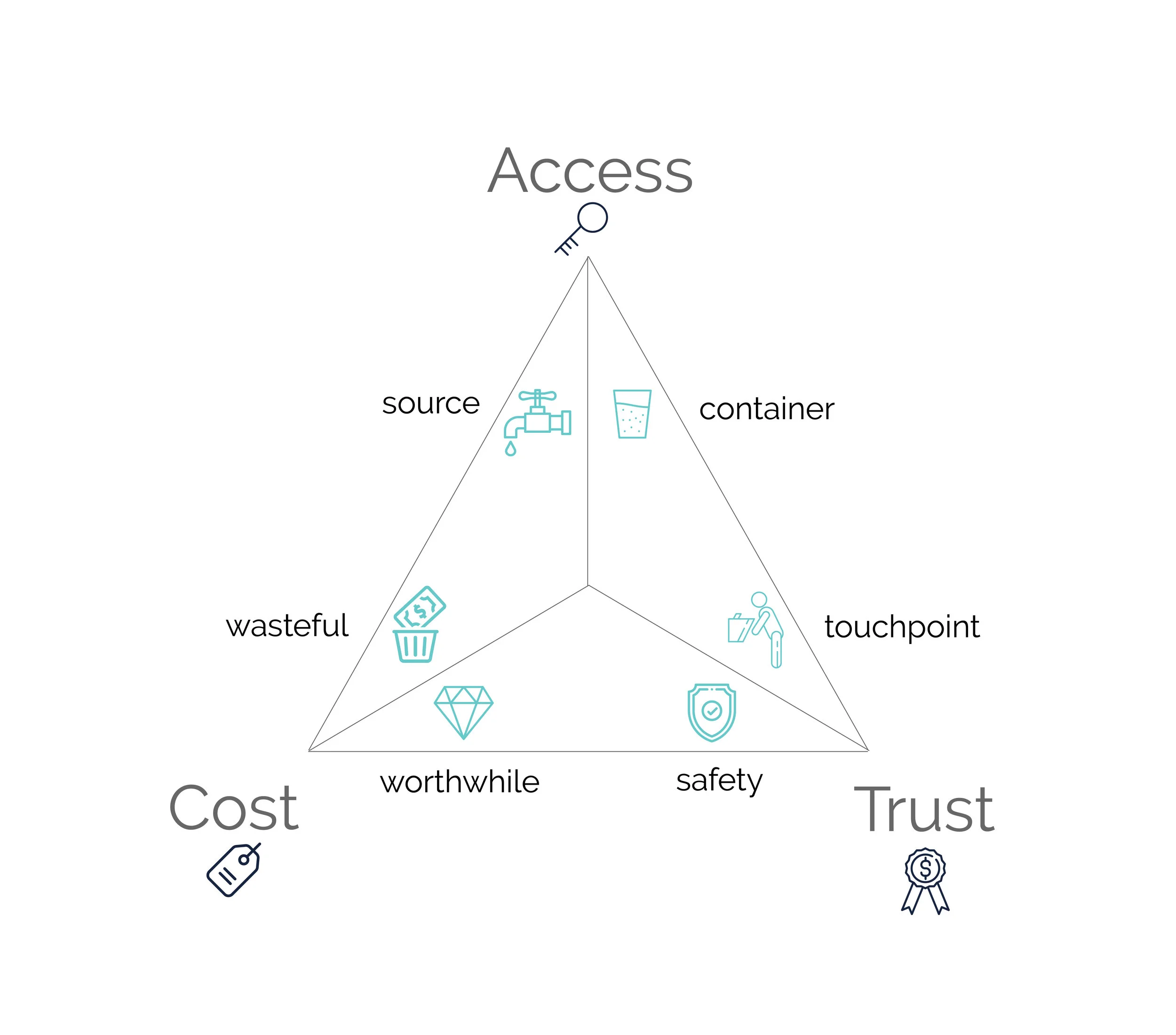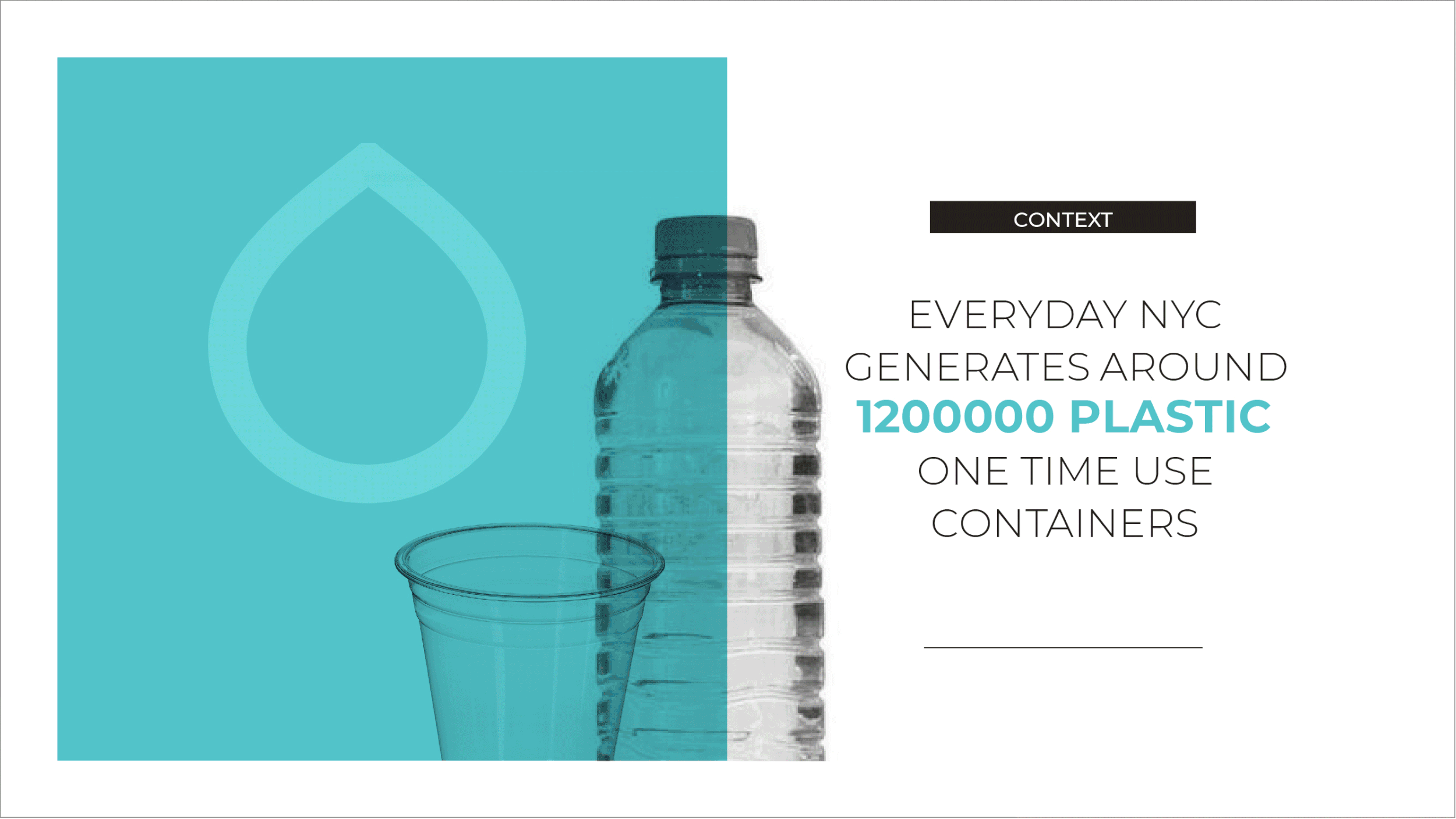MAY 2018
Sustainable solution for NYC’s Plastic Pollution
Context:
"Reefill" is an NYC based social impact start-up, whose mission is to reduce plastic bottle waste and increase the use of tap water in NYC. They addressed this goal with an app which provides the location of "Reefill" water refilling stations across the city, located in various cafes and restaurants.
Reefil provided chilled filtered water for a monthly subscription fee of 1.99/month and normal filtered water for free at these locations. Their value proposition was to reduce the water serving time for customers and increase foot traffic in locations.
Problem
Reefill faced low customer adoption for paid option and had investments in refilling station network maintained and serviced on a monthly basis.
Solution
A service that provides NYC tap water in recycled/reused glass bottles, available for re-use and return at network locations across the NYC for a nominal monthly subscription charge.
Collaborators
Abhishek, Tanvi, Vinay, Aminata
Discover
Eco-system for NYC’s water needs
We conducted in-depth & intercept interviews, along with intensive desk research to map out all possible solutions being used at all levels to provide a service or solution for drinking water in NYC.
We got a holistic understanding of how different entities are solving for thirst at different levels and their interconnections.
User behavior & pain-points
We mapped the water drinking habits of different users, along with the choices they made and factors influencing them.
Define
Insights
Majority of New Yorkers trusted city municipal waters and were proud of its quality.
Immigrant communities and tourists had lower levels of trust in the city water. This was attributed to their past experience of unsafe drinking water in previously resided cities.
Majority of the plastic bottled water consumption was attributed to three major reasons:
Forgetting to carry a bottle
Not being able to carry a bottle
No place to refill a bottle
We discovered that an individual would prefer different solutions based on the situations and their past conditioning, but these choices were based on 3 important factors:
Cost
Convenience
Trust
Design
“How might we provide NYC tap water on-the-go without having to carry a container?”
Access to NYC tap water on-the-go
Our insights suggested that the core problem was access to a “safe” source and/or “sustainable” container for drinking water in the city while on the move.
Based on these insights and keeping in mind our client’s mission, “To reduce the plastic bottle waste generated in NYC and increase the use of Tap water among New-Yorkers.”, we decided to re-frame our problem statement as “ACCESS TO NY TAP WATER ON-THE-GO”.
Imagining possibilities
We generated numerous ideas in multiple brainstorming sessions and filtered them to one which seemed fit to the business model and investments of our client and their intended social impact.
Creating a story
We created a prototype of a service that involved sourcing reusable glass bottles from the waste generated in the city, sanitizing and repackaging them with NYC tap water. These bottles would be then available for pick-up after a payment deposit. Users could re-use or return empty glass bottles at Reefil locations all over the city and get part of their money back.
The prototypes included mock posters and prop bottles to create an experience that is close to real.
Insights
Users were willing to use the service, provided there was an accessible network of refilling stations, pick-up and drop-off points across the city
Users were not keen to pay a returnable deposit for the bottles
They preferred not to be required to pay on each use
Pitch deck proposed to Co-working offices
Test for Desirability
We tested our prototypes with New Yorkers to see if they were willing to use the service over buying regular bottled water.
The service concept received positive response with the main lines of inquiry being:
“Where can I pick-up and return the bottles?”
“How much would it cost?”
“Where can I refill the bottles?”
Insights
Co-working space users cited the time and effort to carry, wash bottles or glasses and refilling them as their main challenges.
Users did not want to use the same glasses or bottles for water and beverages and hence preferred plastic bottled water.
Co-working spaces incurred tipping charges to manage the recycling of the plastic bottles being used by their customers.
Co-working spaces were interested in adopting the service on a subscription plan where a fixed number of bottles could be delivered every week for a cost equal to that of plastic bottles.
Test for Feasibility
To test if the proposed service model was viable or not in a city wide-scale, we needed to test it in a closed system with easy pick-up and drop-off locations. So we chose to pitch our service to co-working spaces, who were providing plastic bottled water to customers, to see if they were interested in hosting this service.
As a part of their sustainability efforts, co-working spaces were providing sustainable drinking water solutions to users and employees, but these solutions were not being adopted by users for lack of convenience
The co-working spaces were forced to provide plastic bottled water because of the convenience.
The co-working offices were interested in hosting the service for their customers, as they believed it to be a more sustainable solution than plastic bottled water.
Deliver
Service Prototype
We produced a video that depicts the experience of the service scaled across the city along with the business model canvas to understand the stakeholders and the value proposition of the new proposed service.











